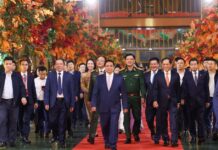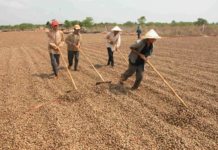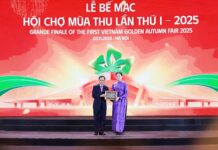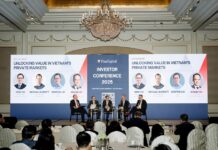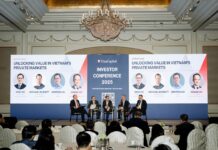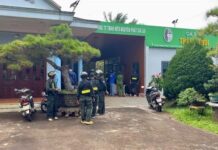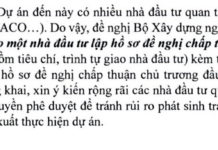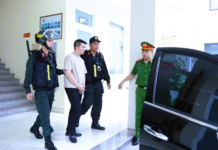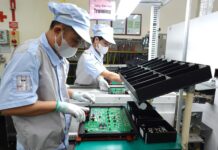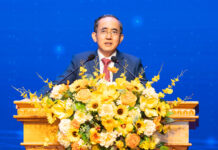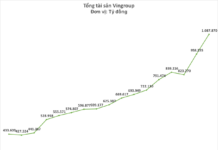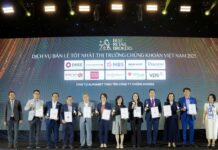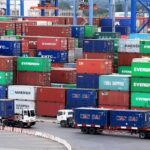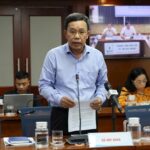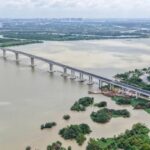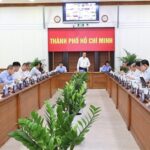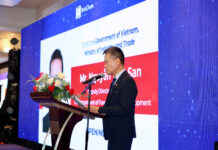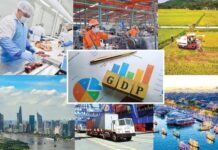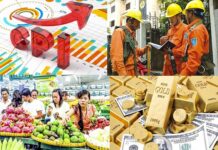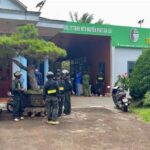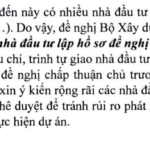Instead of doing business, companies are forced to seek permits.
At the “Meeting between City Leaders and the Foreign Direct Investment (FDI) Business Community 2025” held in Ho Chi Minh City on the morning of October 30, nine associations representing FDI businesses investing in the city highlighted administrative inefficiencies affecting the investment and business environment.
Mr. Seck Yee Chung, Vice Chairman of the Singapore Business Association (SingCham), stated that one of the biggest challenges for investors is the lengthy and complex licensing process, particularly for sub-licenses applicable only to foreign investors.
SingCham representatives noted that business licenses are currently issued by the Department of Industry and Trade under Decree 09/2018/NĐ-CP. However, starting July 1, 2025, the authority to issue business licenses to foreign investors will shift to provincial People’s Committees, as per Decree 146/2025/NĐ-CP.
While the official processing time is 13 working days, it can take 9 to 12 months in reality. The time spent seeking opinions and feedback from agencies like the Department of Industry and Trade is not included in the processing period.
“A beautifully constructed building with multiple office spaces for rent should be filled with companies working on million-dollar projects. Instead, these companies are spending their time applying for permits,” he illustrated at the conference.
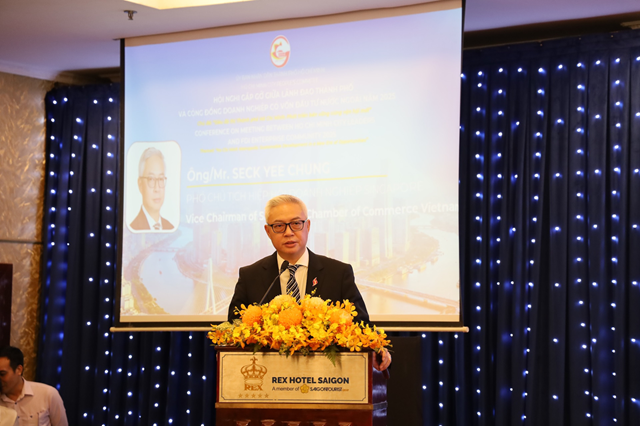
SingCham Vice Chairman, Mr. Seck Yee Chung, discusses licensing inefficiencies. (Photo: ITPC)
|
Mr. Seck Yee Chung added that in rooftop solar projects under equipment leasing models, licensing authorities still classify this activity as “electricity production,” requiring additional business registration that doesn’t reflect its true nature. These issues delay projects and erode trust in FDI capital.
He urged Ho Chi Minh City to shorten business license processing times and ensure compliance with deadlines.
“Licensing agencies must strictly adhere to processing timelines and provide clearer guidelines on required documents to minimize supplementary submissions. We also recommend abolishing the e-commerce business license requirement under Decree 09/2018/NĐ-CP,” he said.
Other foreign associations face similar challenges. The Australian Chamber of Commerce in Vietnam (AusCham) noted that inconsistent licensing, customs clearance, and investment approval procedures reduce the competitiveness of the investment environment. Traffic congestion and logistics limitations further hinder business efficiency.
Mr. Erick Contreras, Vice Chairman of the European Chamber of Commerce in Vietnam (EuroCham), agreed that customs procedures are a persistent concern. Streamlining these processes would attract businesses more quickly.
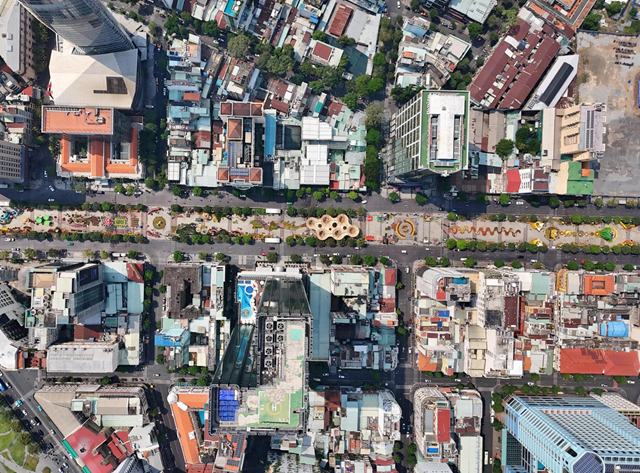
Ho Chi Minh City Commits to Reducing Red Tape
Mr. Okabe Mitsutoshi, Chief Representative of the Japan External Trade Organization (JETRO) in Ho Chi Minh City, urged the city to simplify administrative procedures, improve legal frameworks, and enhance transparency in processes like company establishment, imports, work permits, and visas to support stable operations for Japanese businesses.
JETRO’s “2024 Survey on Japanese Businesses Operating Overseas,” released in November 2024, identified the top three risks in Vietnam’s investment environment: complex administrative procedures (62.4%), rising labor costs (58.9%), and an incomplete legal system with unclear enforcement (57.8%).
The percentage of businesses citing “complex administrative procedures” and “an incomplete legal system” as risks in Vietnam exceeds the ASEAN average, indicating these issues are particularly severe, according to JETRO.
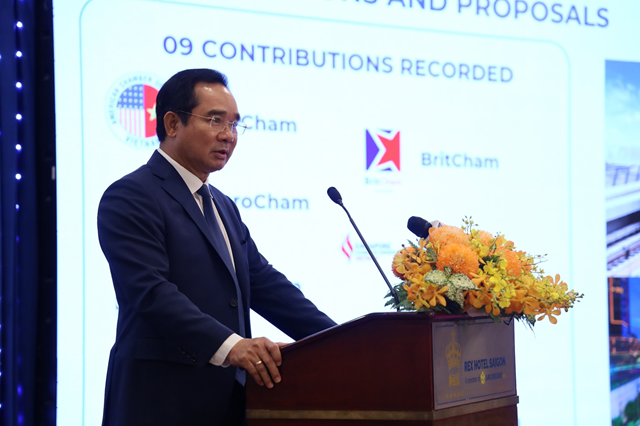
Ho Chi Minh City Chairman Nguyễn Văn Được pledges to reduce administrative burdens. Photo: ITPC
|
After hearing FDI business concerns, Ho Chi Minh City Chairman Nguyễn Văn Được acknowledged that administrative procedures remain cumbersome, time-consuming, and costly, particularly in terms of opportunity costs for businesses.
“While changes can’t happen overnight, no matter how challenging, we must act,” he emphasized.
The city aims to reduce administrative burdens by at least 30% in terms of cost, time, and the number of procedures.
He encouraged FDI businesses to trust and partner with the city in revolutionizing administrative reforms and improving government service attitudes, both locally and nationally.
To prevent Vietnam from becoming just an assembly hub, he urged FDI businesses to share technological expertise, especially core technologies, to foster mutual growth. Ho Chi Minh City seeks high-quality FDI capital.
“The success of FDI businesses reflects our governance and investment environment. We value every investment, idea, and commitment,” he concluded.
Trần Chung
– 21:10 30/10/2025
Unlocking Growth: Ho Chi Minh City Ignites Three Key Drivers to Stay Ahead
Over the past 10 months, Ho Chi Minh City’s economy has shown significant highlights. However, to achieve the annual GRDP growth target of 8.5%, the city must aggressively activate three key drivers: consumer spending, exports, and public investment.
Ho Chi Minh City’s Department of Construction Updates on Tidal Surge Developments and Response Measures
Over the past period, as forecasted by the Southern Regional Hydro-Meteorological Center, the combination of the Northeast Monsoon and tidal cycles has caused an unusually high sea level rise. This resonance resulted in a tidal peak of +1.82m, surpassing the Level III alert threshold of +1.6m, leading to flooding in many low-lying areas across Ho Chi Minh City.
Ho Chi Minh City Generates Over VND 27,000 Billion from Land Use Fees and Rentals in Can Gio Coastal Urban Development Project
Over the past 10 months, Ho Chi Minh City has seen a remarkable surge in revenue from land use fees, particularly driven by the Can Gio Coastal Urban Area project.


